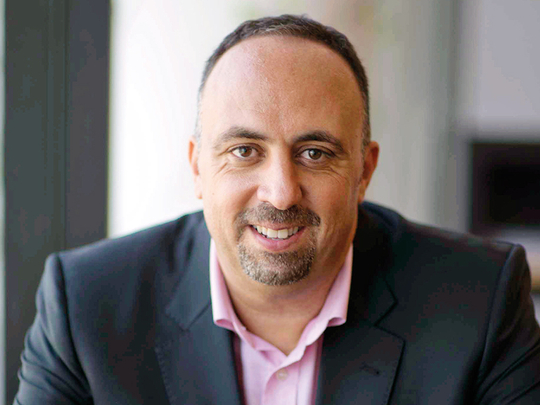
Dubai
Reda Raad is not one to feel too optimistic when there is no reason to. These days, even more so.
“This level of turbulence, this level of uncertainty, will only continue in one form or another,” said Raad, who heads the regional ad agency network TBWA\Raad. “The days of crazy growth — and organisations operating on autopilot — have long gone. During the past couple of years we have been through what I consider to be one of the toughest periods the GCC ad industry has ever faced.
“The market has had to get to grips with ad spend being at its lowest in recent memory. I’m an optimist ... but reality bites and it can hurt. We’ve faced growing competition from consultancies and seen technology transform our industry beyond recognition [and] all in the midst of regional conflict and political unrest.
“I’d like to say it’s going to get easier, but it won’t. This is the new normal.”
It would be too simplistic to say that Google, Facebook and Instagram and the spread of digital ads have upended the traditional advertising and media industries, and nothing much can be done about it. Raad, for one, is not about to sit around waiting for the future to show up.
“What will be interesting to see is whether the (advertising) budgets for 2019, which will be finalised in November and December, will show any significant signs of improvement,” said Raad. “That will depend on clients’ confidence in the market and their individual growth plans. Ad spend will be marginally down, although the industry could see a revival in 2020 thanks in part to Expo 2020.
“Will there be concerted and innovative efforts to gain market share? Will certain clients make strategic plays? We don’t know yet. But what we do know is that there are always opportunities in times of change and uncertainty.
“Clients won’t be making further cuts because there are no further cuts to be made. All cutbacks and commitments are factored in. The remainder of 2018 will therefore be stable.”
Raad does strike a chord about the cost cutting part. Advertisers responded to the downturn by drastically trimming their ad spends and shifting their dollars to less expensive digital campaigns. Ad agencies too have been following the path of lower costs and hoping to maximise as much as they can out of clients; digital and social media spending. But how long can this focus on cost continue?
“There is never an end to reducing the cost of operations, but that is not a focus,” the CEO said. “Not at the expense of quality, resonance and relevance. Were it so, all advertising would have shifted to lower cost centres by now. Agencies continue to lower their costs of operations and are being reasonable about it. But reducing cost can never replace growing the top-line.
“Agencies that have concentrated on operational excellence, are creatively strong, and adapted to the digital and data age will have a better chance at growing at the expense of those who have not.
“Which is why agencies have to take their destiny into their own hands. We changed our operating model, knocked down all of our silos, and hired a new breed of people. A new type of talent capable of excelling in the type of environment we now find ourselves in.
“We are focused on ensuring our agency is the best it can possibly be. To ensure that we are ahead of the game in terms of integration, data and content, and we continue to attract the brightest talent in the business. If you get all that right, then the overall state of the market reduces in significance. It’s that simple.”
Making content that is indispensable
After print, the other old media that’s getting burnt by the new is the region’s television broadcast industry. “TV has the highest weekly reach in the UAE across all ages and among millennials is the second most used medium,” said Reda Raad. “But nothing is immune to the wider economic climate.
“Is any hit to TV spending down to ad rates? Maybe that’s part of the puzzle, but there are many other factors at play. The rise in prevalence of streaming sites such as Netflix, the abundance of choice, and the quality of programming being produced by the TV channels themselves. The only way to ensure that TV in the region doesn’t suffer the same fate as print is to make sure that what’s being produced is indispensable.”
Will creativity suffer in the digital- and data-obsessed industry? “No — Just look at the work that won at Cannes this year. Nissan’s #SheDrives and the Louvre Abu Dhabi’s “Highway Gallery”, both of which won gold at Cannes. Data-driven creativity works and works extremely well. It’s bravery and innovation that make you stand out, not Facebook likes and retweets.”











